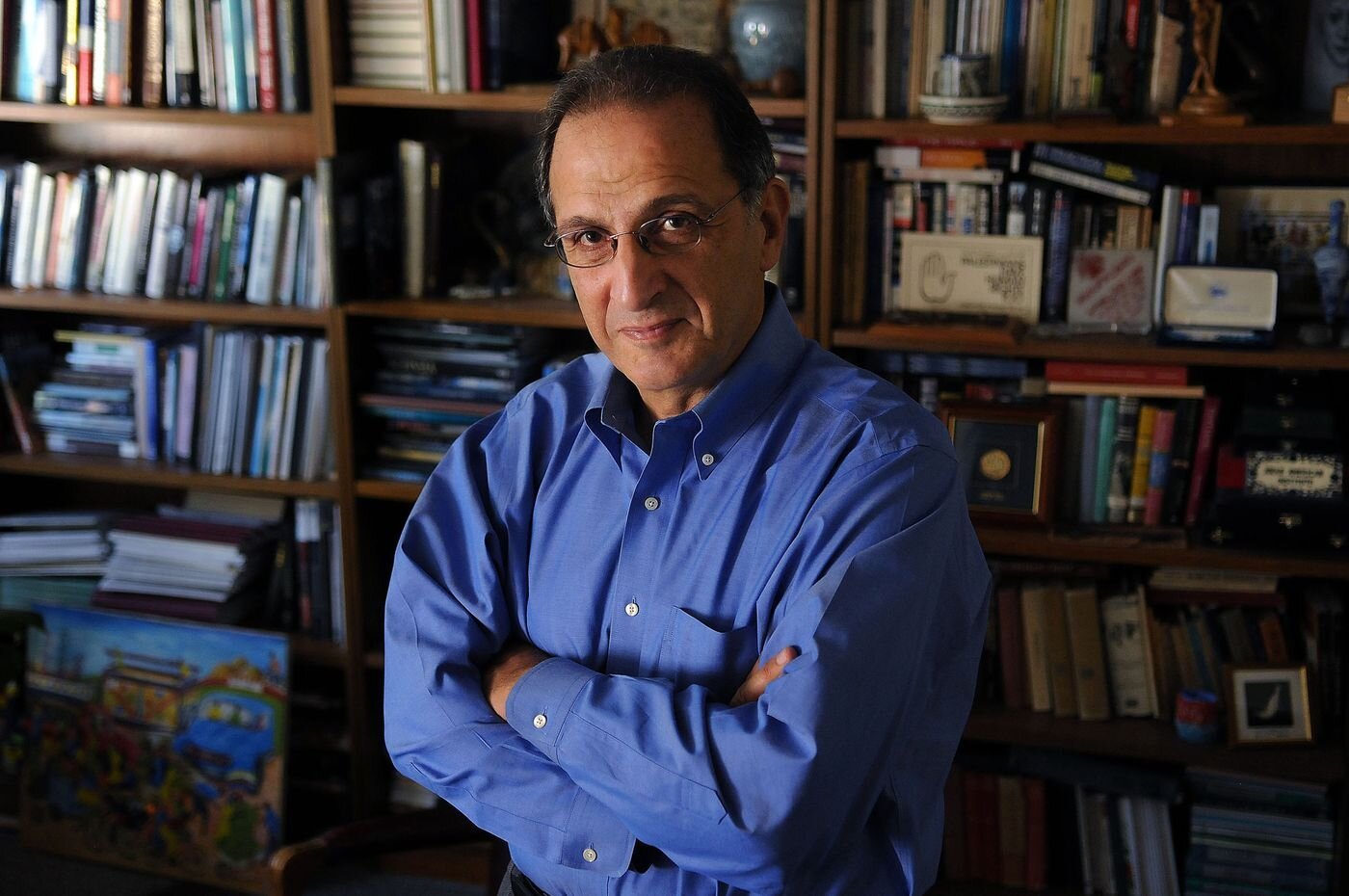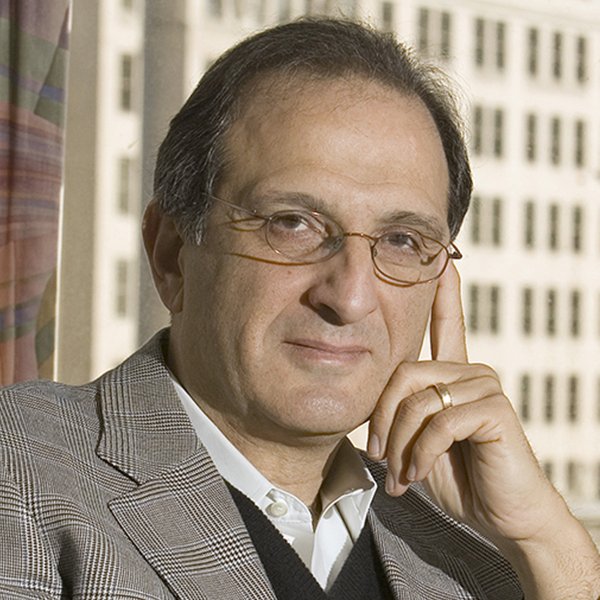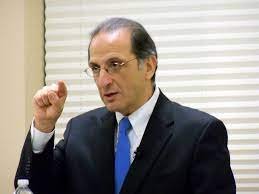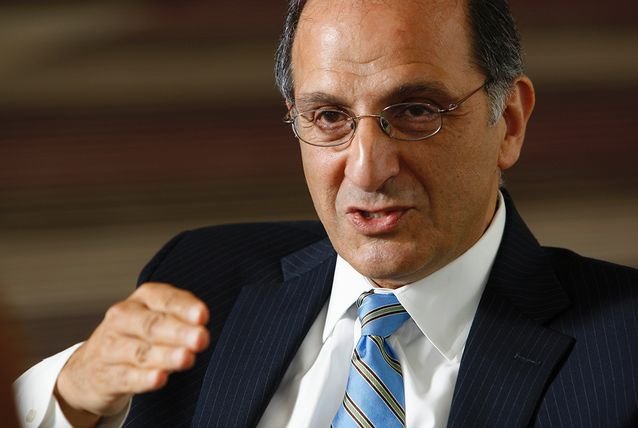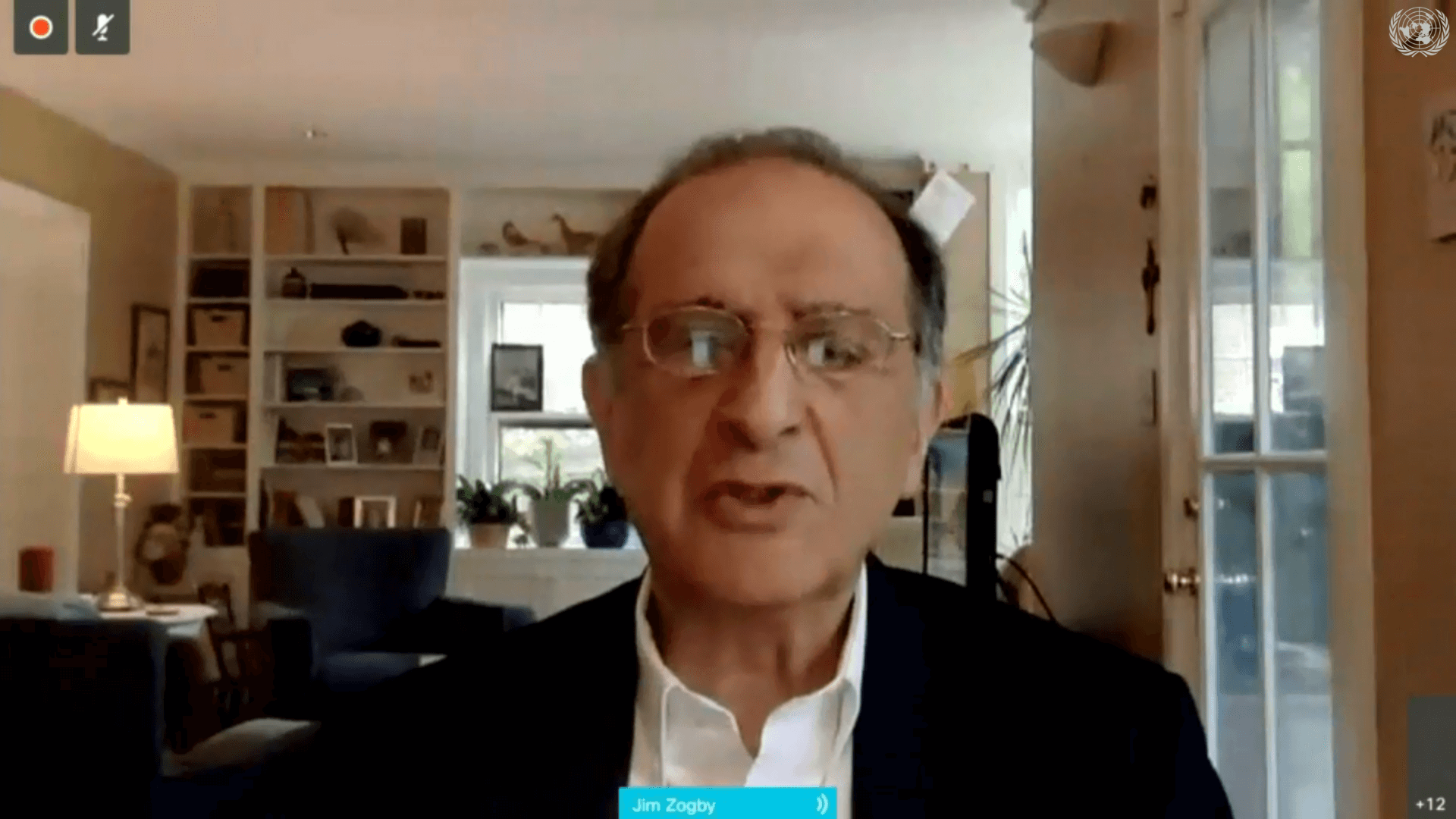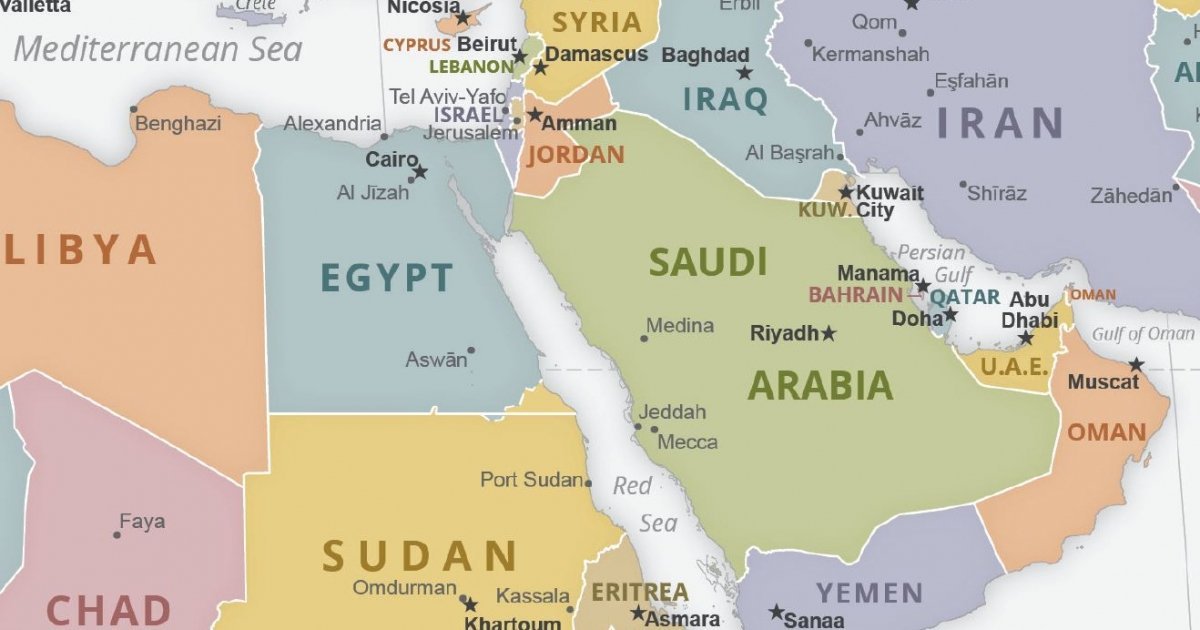Washington Watch Articles From 2000 to 2009
Since 1992, Zogby has written a weekly column on current events and U.S. politics.
This column, Washington Watch, has been published around the world in fourteen countries.
Beginning in 2020, Zogby began weekly conversations titled, “Coffee and a Column with Jim,” where he discusses his latest Washington Watch column and engages in conversation with attendees. Coffee and a Column with Jim is live every Wednesday at 2PM Eastern. Unique registration links are available in each Washington Watch column and on social media.
Washington Watch Articles From 2009
My mother Salemi (Celia Ann) Zogby died last week at the age of 92.
The headline in the local Utica, New York newspaper, “Zogby Matriarch dies at 92”, told only part of her story. She had been, to the end, a leader of my extensive extended family. But she was also a leader in her community.
One of my guests was Newsweek Magazine’s award-winning investigative journalist Michael Isikoff. I had invited him to join me to discuss his cover story in this week’s issue, “The Fed Who Blew the Whistle” (the story of the federal agent who exposed the Bush Administration’s illegal wiretapping of U.S. citizens), and his ongoing coverage of corruption in Illinois politics – now highlighted by the arrest of that state’s Governor, Rod Blagojevich.
Since the article I wrote (alternately titled “Lessons to be Learned” or “Rahm Emanuel and Arab Perceptions”) has generated some discussion, I want to offer a few further reflections:
It is vitally important that Arab Americans engage in politics, but it must be understood is that politics and political empowerment are processes.
Because reality is never ordered and always unpredictable, Presidents should be counseled to avoid setting rigid agendas, or developing too-grand a vision to define their approach to foreign affairs. In fact, looking back in history, it is safe to say that Presidents are most often defined as successful not by the agendas they set, but by how they adapt their agendas to respond to crises that unpredictable reality that sets for them.
In looking back at the now-completed Presidential contest it is striking to note the degree to which Arabs, Muslims, and Islam itself, were factored into the race.
Because expectations across the Middle East are so high and the need for change is so great, during the next two months, all eyes will be focused on the early decisions made by President-elect Barack Obama.
On November 5th, my office sent an email to tens of thousands of our members and contacts congratulating President-elect Barack Obama
On many levels the election of Barack Obama as the 44th President of the U.S. represents a transformative moment in my nation’s history. I realize that there are some cynics and critics who will find reason to dismiss the significance of this victory, but they are wrong – and I want to share some personal reflections and vignettes from the campaign that describe this moment’s meaning for so many Americans.
You are reading this just hours before the conclusion of the longest and costliest campaign in American history. Every national poll shows Democratic candidate Barack Obama with a comfortable lead, as do polls in most key battleground states the candidate must carry in order to secure the 270 electoral votes needed to win the election.
While the contest for the White House dominates national and international media coverage, it is important to remember that there are also 35 Senate seats and all 435 Congressional posts being contested this year. As significant as the battle for the White House is, control of Congress can be a critical factor in the success or failure of the next president.
Washington Watch Articles From 2008
Many years ago, I came across an pre-Islamic Arabic poem describing a camel running across the desert. Suddenly, the camel freezes in mid-stride.
Eight years after the unfolding of the events of "Arab Spring," Tunisians and Egyptians appear deeply displeased about the situations in their respective countries.
Because I have a long and complicated history with Temple University, I have closely followed the story of the backlash against Temple Professor Marc Lamont Hill for the speech he delivered at the United Nations' "International Day of Solidarity with the Palestinian People."
I was having lunch this week with an Arab friend and before long, as expected, the conversation turned to Donald Trump, the impact he is having on our political life and the world's perception of America and the American people.
Last week, after reading my column, "The Struggle to Advocate for Palestinians Has Never Been Easy," a reader did a bit of research, found, and then sent me an article I had written 30 years ago.
It has never been easy for Arab Americans to advocate for Palestinian rights and while we've made real progress, the challenges continue to grow.
This election was the meanest, dirtiest, and most disgraceful in my lifetime—and it will have consequences. Even before the results began to be reported on late Tuesday night, we already knew who the losers were going to be – the American people and our political culture.
US supporters of Israel are in a bind: public opinion is changing; there are more actors publicly challenging Israel; and the crude, heavy-handed tactics they have successfully used in the past to silence criticism now only aggravate the situation.
In recent weeks, the Trump Administration has taken a series of drastic punitive actions against the Palestinian people.
First, the Trump Administration "took Jerusalem off the table." Now, in an especially dangerous display of recklessness, they have announced their intention to do the same for the Palestinian "right of return.
Washington Watch Articles From 2007
After more than one year of near non-stop campaigning, the fate of the 2008 presidential aspirants will largely be determined by the outcome of the January 3rd caucuses in Iowa and the January 8th New Hampshire primary.
We need stories; stories we can live by, that teach us about ourselves. Our stories should speak to the realities of our everyday lives, the fear and insecurity that accompany us as we face birth, death, and all that lies in between.
(Over the past few weeks, as interest has grown in the 2008 U.S. presidential contest, I’ve been asked by friends across the Arab world for my opinion on Barack Obama. Could I explain the phenomenon they are seeing on television? Can he win?
Here is my response.)
Despite the acknowledged centrality of Arab-Israeli peace to U.S. interests and Middle East stability, the recently convened peace conference in Annapolis drew scant attention from the sixteen Democratic and Republican party candidates for president.
Washington Watch Articles From 2006
An article by Tom Friedman, a quote from Secretary of State Condoleezza Rice and a letter by a Virginia Congressman hit in one day last week reminding me how tolerant our national discourse has become of bigotry toward Arabs and Muslims and how condescending policy-makers and analysts have become in their dealings with the Middle East region.
This time of year, hundreds of millions of Christians in the West turn their attention to Bethlehem. But what they think about is not the living, breathing and suffering Palestinian city that is real, but a Bethlehem that exists in their imagination.
Here’s the obvious: the two principal factors accounting for this animosity are US policy toward Iraq and Palestine. In four of the five Arab countries covered in our 2006 survey (Saudi Arabia, Egypt, Morocco and Jordan) respondents pointed to US policies in those two areas as the major reasons for their negative attitudes toward the US. Only Lebanon was different. There, of course, US policy toward this summer’s war on Lebanon was the main source of animosity.
Most press accounts have focused on the fact that the ISG report terms U.S. efforts in Iraq as failing and describes the current situation as “dire.” But a more significant indictment comes through in the report’s 79 recommendations. The long list of solid proposals of what the U.S. needs to do are in such stark contrast to what the Administration is actually doing, that it only reveals a damning gap in performance.
In a series of articles and interviews, architects of the neo-conservative movement have been trying desperately to absolve themselves of responsibility for the mess they helped to create in the Middle East. Like confidence men (“cons”) everywhere, having sold the “snake oil” and been caught, they are now feigning sadness and innocence, pointing the finger of blame elsewhere.
With the Middle East in turmoil, the State Department convened a two day meeting for Arab American leadership earlier this week.
Democrats are in, Rumsfeld is out, and those who care about the Middle East are awaiting the release of the report by the Baker-Hamilton Iraq Study Group (ISG).
Polls show that when asked to name the most important issue determining their vote, “Iraq” is far and away number one. And by an ever increasing margin, voters’ are dissatisfied with the President’s handling of the war.
Throughout the 1990s Arab Americans, like most first and second generation immigrant communities split their votes between the parties, with Democrats edging out Republicans by a few points. In 2000, while Arab American party preference remain Democratic, Bush edged out Gore among Arab American voters (44%-38%) largely due to the fact that almost one in eight Arab Americans voted for Ralph Nader.
Not the least of my concerns, of course, will be the macro-outcome, as in which party will control the House of Representatives and/or the Senate. Let me be clear from the outset—I am a Democrat, proud of the political philosophy of my party, though not always pleased with the positions taken by and performance of some of its leaders and standard bearers.
Washington Watch Articles From 2005
A proposed advertising campaign by a group urging the US to adopt more stringent national requirements for individuals seeking driver’s licenses has become enmeshed in controversy this week.
In the lead-up to the Iraq elections, the White House has embarked on a new public relations strategy. For months now, the President has responded to critics of the war by presenting an exaggerated rosy picture of success.
Arabs are looking more inward today, focusing on issues close to home and self-identifying more with their countries. And despite concerns with employment, most Arabs are quite optimistic about their future
One of the first political lessons I learned after coming to Washington was taught to me by an African American activist who had, in his early years, worked as a strategist with Martin Luther King, Jr.
Washington Watch Articles From 2004
I recently addressed the 11th World Islamic Banking Conference in Bahrain on how Arabs and Muslims are perceived in the West. In preparation for my presentation, Zogby International (ZI) conducted a December poll to discover what Americans think about doing business in the region.
From the outside looking in at America, one might assume that in reelecting President Bush, American voters, fully aware of these situations, approved of those policies and decided to give the President a mandate to continue them for four more years. This, quite simply, was not the case.
n the past month, following the US election and the death of Yasser Arafat, several leading US policy makers and analysts have written opinion pieces, each beginning with a variation on a single theme
t was Sunday. Behind me was the historic St. John’s Episcopal Church where, apparently given the number of Secret Service personnel milling about, either the President or Vice President were in attendance.
Before the Bush Administration pushes ahead with plans to promote reform in the Arab world, attention should be given to the results of our latest Arab American Institute/Zogby International (AAI/ZI) poll.
Sheikh Zayed bin Sultan al-Nahyan, President of the United Arab Emirates and Palestinian Authority President Yasser Arafat.
This was an historic election and Arab Americans responded to its challenges.
The election is over. We learned what we knew all along, that America is a deeply divided nation.
With both Democrats and Republicans having fielded armies of thousands of lawyers posed to challenge and/or defend voting procedures, voter eligibility and vote outcomes, there is real concern that the election of 2004 could end up more conflicted and contentious than the disaster of 2000.
I don’t trust you or any Arab in this country anymore. You are not out for America, you are out to turn this country into a Muslim country and we will not let this happen. Just remember that the Arabs are terrorists…they are monsters and talking peace will not do it.”
Washington Watch Articles From 2003
Lest anyone forget the power of incumbency, President George W. Bush delivered a few reminders in the past few weeks.
The events of last week: the capture of former Iraqi President Saddam Hussein, a controversial speech by Israeli Prime Minister Ariel Sharon, and key decisions by U.S. Courts of Appeal have set the stage for developments that will shape the politics of 2004.
Former Vice President Al Gore’s endorsement of Howard Dean for president dominated U.S. political news coverage for three days.
The Geneva crowd hit Washington like a storm last week. After publicly launching their peace initiative in Switzerland, the group of 10 Israeli and Palestinian activists and leaders came to Washington and New York to promote their effort.
It was over one month ago that it came to light that one of the Pentagon’s top officials in the war on terror, Lt. Gen. William Boykin, had repeatedly made statements, in uniform, displaying an anti-Muslim bias.
There is growing concern that the Department of Justice (DOJ) has over-reached in the post 9/11 period, implementing several programs that have caused harm to Arab and Muslim immigrants and visitors to the United States.
Having just returned from a short visit to the Arab world, I find that the disconnect between the United States’ Middle East policy debate and realities in the region, has never been greater than it is today.
I have just completed a three-day visit to New Hampshire and Iowa, the states that feature the first Democratic presidential contests of the 2004 election. They are both relatively small states.
When in 1948, then President Harry S. Truman met with his advisor to discuss whether or not the U.S. would recognize the soon to be declared Jewish State of Israel, he was reminded by State Department officials of Arab concerns and of U.S. interests in the Middle East.
Washington Watch Articles From 2002
Less than one month remains before Israeli voters go to the polls for their third national election in four years.
There’s a wonderful old saying that describes the situation where “the right hand doesn’t know what the left hand is doing.
By now the world knows that Republican Senator Trent Lott is in trouble because of the comments he made at a December 5th, 100th birthday party for retiring Senator Strom Thurmond of South Carolina.
Americans are frequently asked by public opinion pollsters to give their evaluations of other countries in the world.
The US-Saudi relationship, while still strong on the official end, is nevertheless in grave danger.
I’ve always maintained that for there to be an effective U.S. policy pressing for a just Middle East peace, there had to be a U.S. constituency that demanded such a policy.
The Republican takeover of the United States Senate is widely credited to the remarkable ten-day effort made by President George W. Bush.
For Arab Americans the 2002 elections produced much good news, some bad news and, in other instances, no news at all.
To the anti-Arab polemicists of the world, the answer is simple: the Arabs are driven by their hatred of Israel and the West.
During the past year there has been an unprecedented interest in the Arab world. Many in the West, profoundly shaken by the traumatic events of September 11, 2001, began to look more closely at the Middle East, a region, about which they only had limited knowledge.
Washington Watch Articles From 2001
2001 began awkwardly. It seemed from the beginning that this was not destined to be a good year. As the year began here in Washington, there were signs of problems, on both the domestic and international fronts.
There is almost no good news in the most recent Zogby International poll on the U.S. public’s attitudes toward some Middle East countries and the continuing Arab-Israeli conflict.
Some pro-Israel groups and their erstwhile friends in the neo-conservative movement are not satisfied with the destruction of the Middle East peace process.
Five years ago I wrote an article in which I discussed a strategy paper that had been prepared for then-Israeli Prime Minister Benjamin Netanyahu by a group of leading US neoconservatives.
Much has been written about what is happening to Arab Americans and American Muslims in the U.S.
Israel’s early responses to U.S. Secretary of State Colin Powell’s long awaited Middle East policy speech shows just how difficult it will be to revive peacemaking efforts.
During the past week, I found myself engaged in two parallel and, in many ways, complementary sets of discussions.
My children are fond of teasing me about my age. They say, “it must be fun being 55 years old, because you get to meet new people every day.
Sometimes it feels as if we are living on the edge. The wounds of September 11 are still open, the anthrax scare continues to grow, and now the nation’s leaders are warning of credible threats of new terrorist attacks.
There has been an unprecedented spate of news articles and media commentary critical of the U.S.-Saudi and U.S.-Egyptian relationship.
Washington Watch Articles From 2000
It has become a cliché to observe that George W. Bush won the presidency without a clear mandate to govern.
The results of a recent poll of Arab American voters in the 2000 elections yields a fascinating portrait of the community.
This week 40 Arab Americans from 14 states representing 10 national organizations and a number of local organizations will convene a leadership summit in Washington, DC.
If George W. Bush becomes the next president of the United States, he will most probably be given a short honeymoon in the Arab world. Al Gore will not.
As I crossed Pennsylvania Avenue on my way to the White House this afternoon, I noticed a half-dozen construction trailers set up in Lafayette Park.
The collapse of the Israeli-Palestinian peace process and the continuing economic sanctions against Iraq have combined to create a difficult situation for the United States in the Arab world. It requires an immediate U.S. response.
We are living in a remarkable time. It has, by now, become a cliché to observe that there has never been an election like the one currently unfolding in the United States.
While candidates from both parties came and courted Michigan’s Arab American voters this past year, New York’s Arab Americans experienced only painful exclusion.
To understand the comings and goings of the presidential candidates during the final days leading up to the November 7 election, it is important to understand the exact nature of the process by which we in the United States elect our presidents.
One year ago, Arab Americans set an ambitious agenda for “Campaign 2000.” We were determined to bring Arab Americans and our issues to the center of this year’s election.
